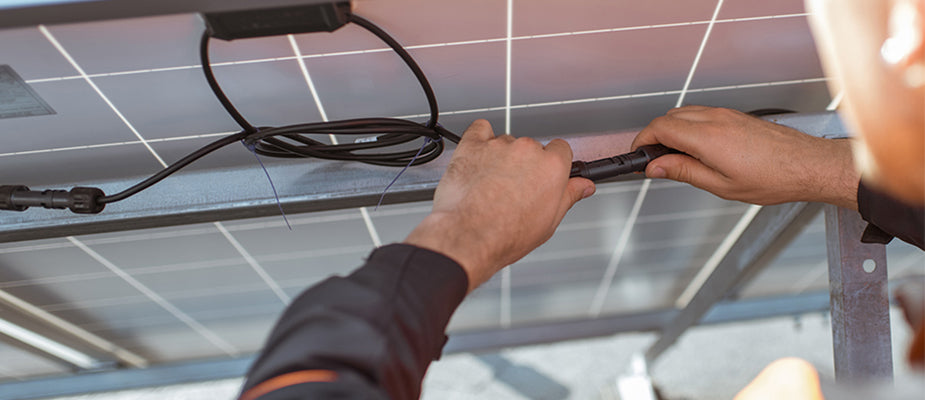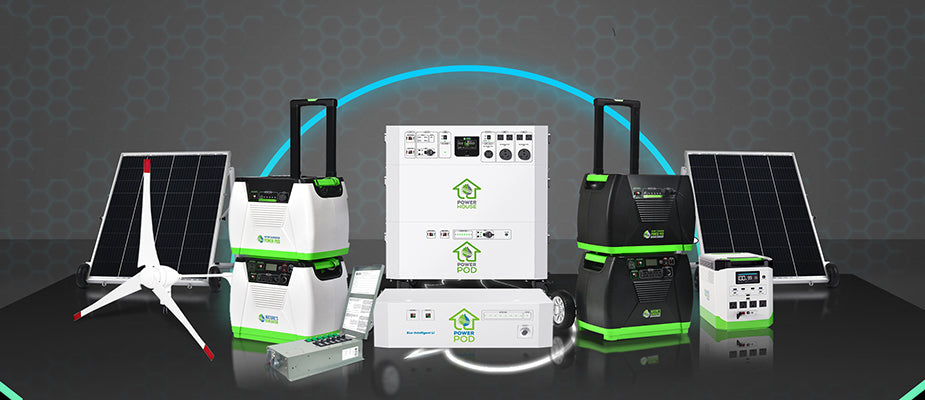In the quest for reliable yet sustainable energy sources, solar power systems are surely at the forefront of the best options to generate electricity. And there are tons of decisions and considerations to make when it comes to installing solar systems – such as whether to go off-grid or on-grid.
To put it simply, off-grid solar systems operate independently of the main power grid. On-grid or grid-tied systems, on the other hand, refer to solar systems that are connected to the main power grid. Each has unique features, advantages, and applications that benefit different needs and locations. In this article, we’ll explore the difference between off grid and on grid solar system, their benefits and potential drawbacks.

What's the difference between off grid and on grid solar system?
Off-Grid Solar System
Off-grid solar systems are designed to be self-sufficient and not reliant on the electric grid, making them ideal choices for locations where connecting to the grid is unavailable or impractical. They are reliable backup power sources for homes during emergency situations, natural disasters, and grid failures – which are, unfortunately, becoming more common in the U.S.
Off-grid systems are also a popular choice for individuals who are embracing sustainable living practices or those who want to build off the grid houses or eco-friendly homes.
On-Grid Solar System
Like off-grid solar systems, on-grid solar systems generate electricity using solar panels; however, the difference is that on-grid systems are also connected to the electric grid. The excess energy produced by the solar system is fed into the grid, often through net metering, where users can receive credits or compensation for the surplus electricity. On-grid solar systems eliminate the need for battery storage as they rely on the grid when solar production is low, for example, during cloudy days.
On-grid solar systems are good options for homes in urban and suburban areas or locations with reliable grid connectivity. They provide a reliable and stable power supply because electricity can seamlessly be drawn from the grid, ensuring continuous power availability.
How Off-Grid Solar System Works
There are basically four main components of on grid solar power systems, these are: solar panels, charge controllers, inverters, and battery storage. Solar panels are typically mounted on rooftops or open spaces, capturing sunlight and then converting it into direct current or DC electricity. The charge controller then regulates the voltage and current from the panels to prevent the batteries from overcharging. The inverter would convert the DC electricity to alternating current or AC, to make it compatible with household appliances. Battery storage is a vital component of off grid and on grid solar systems, because they store excess energy that was harnessed from the sun. This stored energy is used during periods when sunlight is low, ensuring a continuous power supply.
How On-Grid Solar System Works
The key components of a grid-tied system include solar panels, inverters, and a grid connection. Like the off-grid solar system, the panels harness power from solar panels and generate DC electricity. The inverter then converts the DC current to AC. On-grid solar systems do not require an extensive battery storage unlike off-grid systems. As mentioned earlier, the excess power generated by the solar system will then be fed into the local grid.
Key Considerations: Comparing Off Grid Solar and On Grid Solar System
Energy Dependence
From its name, off-grid solar systems are completely autonomous from the electric grid. On periods where there is low sunlight, the system uses energy stored in batteries to supply power. As off-grid systems are independent from the grid, power supply won’t be affected even if the grid has blackouts and interruptions.
Grid-tied systems, on the other hand, draw power from the grid when there is low solar production. and their excess electricity are contributed to the grid.
When deciding whether to choose an off grid and on grid solar system, it’s good to assess the level of autonomy that you require. An off-grid solar system is ideal if you want to seek complete independence from the grid, or if you’re looking for a reliable power backup, while a grid-tied system would suit those who are looking for continuous power supply.
Reliability
Unlike on-grid systems that can draw power from the grid, off-grid solar systems solely relies on the energy it produces and stores. This means, there could be potential challenges during extended periods where there is low sunlight. Fortunately, there is a solution to this, such as adequate battery sizing and efficient energy management. Home backup power solutions, like solar generators, ensures reliability even on cloudy days.
Off-grid solar systems will continue operating and provide your household electricity even during blackouts nad power outages. As for on-grid systems, you will also lose electricity if the grid is down as they are designed to automatically shutdown (and also mandated by law) during blackouts. The reason for this is to prevent the system from sending energy to the grid and keep the utility workers who are fixing the powerlines safe. A workaround for this, however, is to set-up your grid-tied solar system with battery backup.
Cost
On-grid systems are generally more cost-effective up front since you won’t need to install extensive battery storage. You will, however, still have to pay ongoing electric bills, but definitely at a lower cost (on top of incentives/rebates for net metering programs).
Off-grid solar systems would require a bigger upfront investment as they have additional components like batteries to store energy. A power system that is not tied to an electric grid, means you won’t have to pay any electric bill, which also means long-term savings.
You could qualify for the Federal Solar Tax credit, whether you choose to install off-grid solar or on-grid solar systems in your home. The tax credits is a clean energy incentive that is made available to households who opt to use solar panels and solar-powered generators in their homes.
Disclaimer: You should always consult your tax professional to determine your eligibility for the Residential Clean Energy Credit under Section 25D of the Internal Revenue Code who can examine your individual situation and circumstances. Nature’s Generator does not guarantee that you will qualify for this tax credit and any information we provide is solely for educational purposes and should not be considered legal advice, professional tax advice, nor financial guidance.
Location
A huge consideration when comparing off grid and on grid solar system is the locations. Off-grid systems offer a self-sufficient energy solution, which means they are the best choice for homes in remote locations and they are also great to use as back up power for homes. On-grid systems are more suitable for areas that have reliable grid access.
Which is better, off grid on on-grid solar system?
Choosing between off grid and on grid solar system is a decision that you should closely asses as both come with a set of advantages and considerations. By closely evaluating factors such as energy dependence, reliability, cost, and location, you can make an informed decision that will align with your requirements and sustainability goals.

Top Choice for Solar Power Systems
For budget-friendly and user-friendly solar power systems, Nature’s Generator has a wide range of portable and whole-house solar systems that will fit various power requirements. The Lithium 1800 is a portable, yet powerful generator that can power essential appliances and devices. Nature’s Generator Elite offers more power and output options and longer battery run-time. Powerhouse can power almost anything in a home – even the power–sensitive appliances such as computers, refrigerators and freezers. The beauty in Nature’s Generator systems is that they are expandable, allowing you to add batteries and draw more solar power to make fit what you need.
If you want to know more about Nature’s Generator products, please reach out to our customer representatives.
* We want to give credit where credit is due. Professional writer, Ishna Sablaya, contributed research and content to this blog titled: Off Grid Solar and On Grid Solar Thank you, Ishna, for your contributions!










